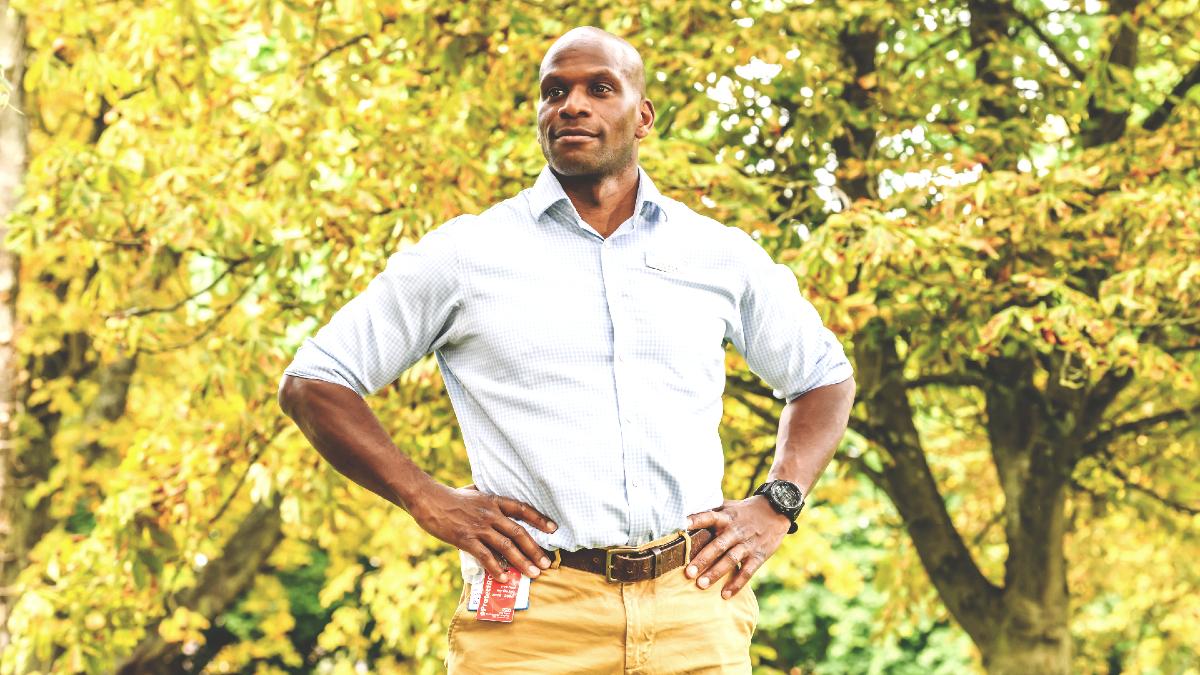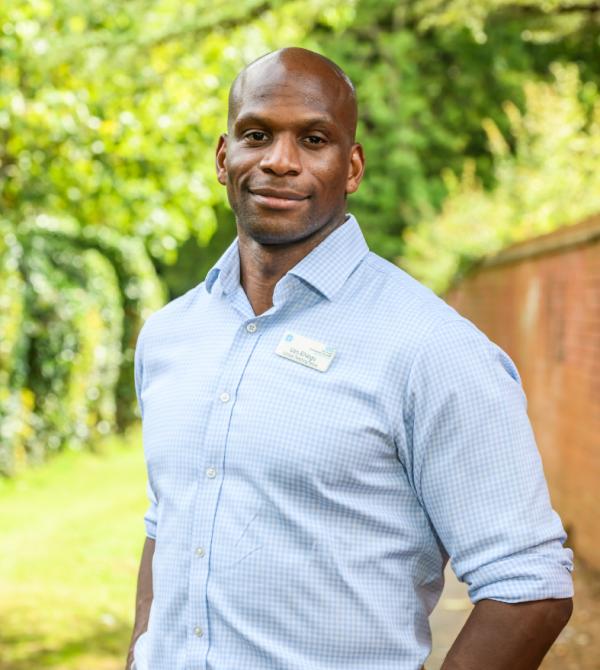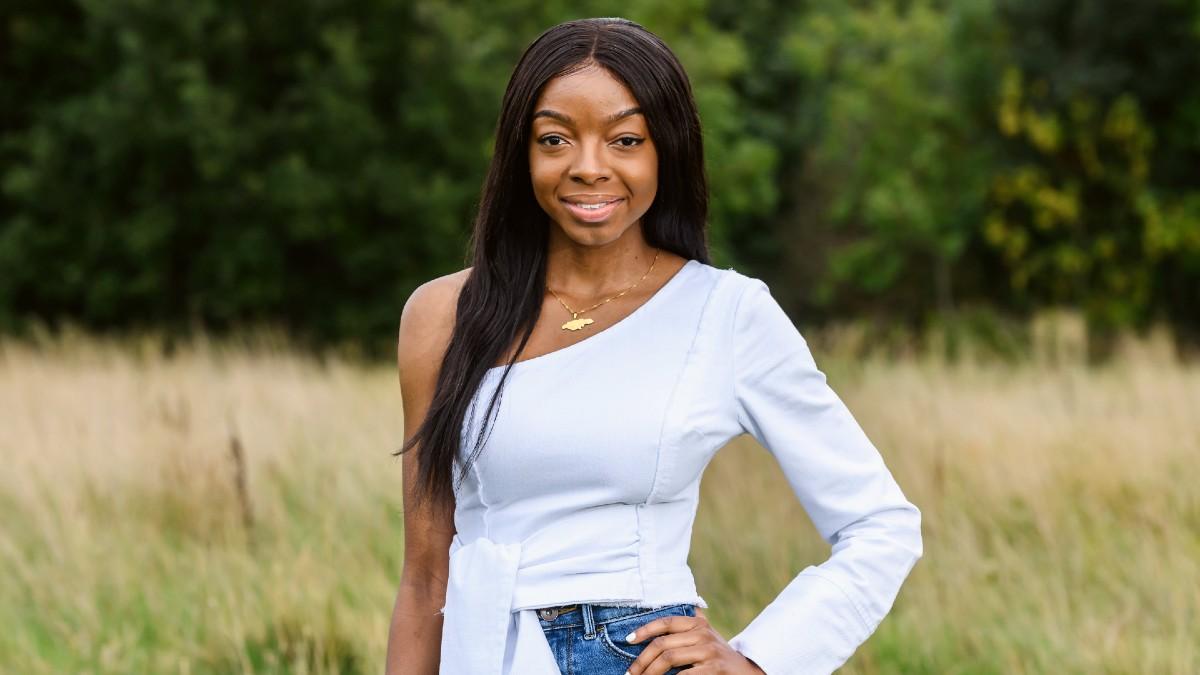To mark Black History Month, we talk to black physiotherapy workers, who share their stories, their achievements and aspirations.
Physiotherapy is an ever-growing, active and industrious field to work in. Learning about the low numbers of black physios joining the profession highlights the need and importance to celebrate and recognise their work.
They are visible, and are making great moves. They are bigger than a statistic. They have brilliant stories to share, and what better way than to hear the during such a significant time to further celebrate and embrace them and their journeys.
Having a work environment that is reflective of the diverse societies many of us may live in is so crucial for representation, as one is able to gain a better cultural knowledge, and therefore able to understand and respond to the needs of patients.
And that’s exactly what these seven brilliant individuals have been doing so well. They share more about their journeys towards where they are now, what inspired them, how their job empowers them, and tips and advice for those wanting to follow in their footsteps.
A passion for physiotherapy
Let’s start with Leanne Antoine. She has a striking and warm personality that shines through when we talk. Her journey to becoming a physiotherapist probably started at the age of three when she began gymnastics.
She was always very keen on sport. And her late grandmother, who was also an orthopaedic staff nurse, would always say that she would be a great physiotherapist.
Leanne reflects on how her grandmother would heat up olive oil and ask her to rub her back when she’d come home from her long shifts, encouraging Leanne to use more pressure during her massage.
Leanne felt that her grandmother taught her the art of touch, the art of reassurance and the ability to connect with people through touch.
Today, Leanne says, ‘I’ve been able to explore so much more of who I am and what I have the capacity to achieve, beyond my initial qualification’.
She is extremely passionate about her job as a physiotherapist, and is also a voiceover artist.
‘I love using my voice to spread positive encouraging messages via social media platforms,’ she says.
‘Working for myself has really helped me identify how to assist people more with the specific help that they need, whether that be patients, or going into schools and speaking with students about career advice.
Connecting with people on a deeper level while getting to do my job really empowers me – I’m inspired by it, and I know every patient is teaching me something about myself, and I’m always ready and open to see that myself too.
She shares a highlight: ‘I think I’ll remember this until the day I die. An elderly lady had sustained a fall and was really struggling to walk with walking aids. She gave me a goal: to get her walking as soon as possible.
'She wanted to go and live with her new husband who lived several hours away. In all honesty the goal didn’t seem achievable but we set a target of being able to improve her mobility with four sessions. The patient always wants to know a time-frame.
'Quite simply, I empowered this lady to believe that her body could heal and move the way she wanted it too. So said, so done: she was able to walk inside and outside without her frame.
'During the process I got to meet the patient’s husband and learned that they had never had a honeymoon. As a business woman, you become increasingly connected, particularly with people in your local area, so I arranged a meal at a local restaurant with an executive car pick up to help the couple celebrate their marriage.
‘That couple embraced every aspect of themselves, and it moved me so much.’
There is no doubt that working with people and building rapport with them everyday makes the job more personable. It’s also no surprise that students cite reasons like this for their aspiration to work in physiotherapy.
Health literacy
TJ Okor is a BSc physiotherapy student at the University of Winchester. How did he decide to study physiotherapy?
‘From a young age I’ve always wanted to help people,’ he responds. ‘I’ve always wanted to do something in healthcare but narrowing down what I specifically wanted to do was quite difficult.
'A school teacher asked if I ever thought about becoming a physio, and I honestly didn’t know it existed until I was in my mid teens.
'So from the age of 16 I pretty much fell in love with it, and over the past few years I have become dead-set on becoming one officially.
Knowing what I wanted to do from a younger age really motivated me and gave me an advantage.
'I remember telling my parents and them not knowing much about the career – and that was the same as me too. I did my research and came back to them and they seemed enlightened and eventually a lot more enthusiastic about it too.
'In many Nigerian households like mine, it’s a normal expectation from parents to go for the traditional lawyer, accountant, doctor route.’
TJ says: ‘In terms of the community I come from, I could count on my hands the people I know who have actually gone to visit a physiotherapist.
'There have probably been countless times where they required it or could have definitely benefited from it, so this is why having health literacy is so important.
'I’m glad to be in the position to offer these tips and advice to people like my parents, for example, when they are facing any discomfort or back pain like they have in the past.
Physiotherapy can be such an asset to the black community, so it feels great to help in bridging that gap with the advice and work I do.
'I’m excited to pursue this as a career and look forward to the journey ahead.'
Conversely, Uzo Ehiogu is almost two decades into the world of physiotherapy, and has spent that time helping, teaching, and serving others, ranging from a military background to his current consultant physio role, with many varying experiences in between.
So, how does Uzo summarise all of the inspiring work he has carried out over the years?
‘I’ve got several job titles because I do quite a few different things,’ he explains.
‘One of my job titles is consultant physiotherapist in rehabilitation and physical preparation. Another one of my job titles is clinical teaching fellow in the NHS, and I’m also a visiting fellow and lecturer at a number of universities here in the UK.’
Black role model
Uzo came to the profession, he says, from a ‘non-traditional background’. ‘I didn’t have A-levels at the time where most people now would need to have A-levels in order to become a physiotherapist,’ he says.
‘Seventeen years ago when I wanted to become a physio, I was actually enrolled into a BTec in hotel catering.
'During that time, I got into a bicycle accident, then ended up having to see a physiotherapist and that’s what sparked my interest in physiotherapy.’
He continues: ‘At that time I also realised that I didn’t really want to study A-levels, so ended up doing an access course to science, which I would attend in the evenings after work, and then did a degree in applied sports science, and then finally a degree in physiotherapy.
'I finished my first degree and graduated with a first. I found out I was dyslexic during my physiotherapy degree thanks to my lecturers at the University of East London.
‘My first job in the NHS, as a junior physiotherapist in a hospital, was quite an interesting experience as that was where I came across my first black role model in physiotherapy. She played an instrumental part in my journey and early growth process.
Today the percentage of black physiotherapists in the UK is painfully low, so you can imagine how it was for me when I first started years ago.
Traditionally, physiotherapy as a profession has been perceived as white and middle class, with some research showing that, from 2017 to 2018, only 19% of all UK physiotherapy programme student enrolments were from a black and minority ethnic background.
‘The challenge we have as a profession to address this disparity is twofold,’ Uzo believes.
‘Firstly, we need to ensure visibility of the profession within inner city schools and secondly, we need to examine why student enrolments are so low.’
Uzo’s upbringing also motivated him to get where he is now:
My dad always told me that I had to work harder than everyone else, so that’s what I did.
'As a junior physiotherapist in the NHS, I worked part-time for a football team in the evenings, I have been a representative on several national physiotherapy committees, I wrote my MSc dissertation while on an operational tour in Afghanistan.
'So, I am used to hard work. However, we need to be honest as a profession and recognise the unconscious bias that we all have.
'I think as a mature profession we can all play our part to understand this, so we’re inclusive and attract a representative workforce for the good of our patients.’
Seeing people who look like you
So how does a black aspiring physiotherapist work towards ‘taking up space’? Akiema Allison’s positive attitude and determination led her to her current studies in physiotherapy with integrated masters at Keele University.
She says: ‘From the age of ten, subjects I tended to warm more towards anything to do with physical education, health in general and remaining active, and these interests further developed as I went to secondary school.
'I felt like it was in alignment with a lot of my personal characteristics and how I learn as a person. I like to learn the theory of something, be able to apply it, and then see the results. Physiotherapy definitely plays a big part of this process.
‘When I was taking my A-levels, I had quite a few interviews when applying to universities. This was not an easy process at all. I honestly didn’t know what to expect at times – would there be any black people in the room interviewing me?
'So many thoughts came to mind. Some interviews did not go well at all and I faced a lot of rejections. However, the rejections did prepare me for future interviews and definitely gave me more confidence.
'It’s so easy to dwell on failure and I used to hate getting things wrong, but I believe that sometimes you need to fail to get to where you want to be.’
Akiema believes that ‘there is so much power in representation’. She says:
It’s such an uplifting feeling seeing people who look like you doing something you aspire to do. It’s harder to feel that you belong in places where you are not represented.
'There’s not many of us on my course and we do stand out. This motivates me though, as I can inspire others too. I really want to encourage diversity and feel like me being here is a starting point. And this is not only important for representation, but plays a massive difference when carrying out our jobs and interacting with patients.
'If you don’t understand their background or culture, you will often misunderstand and make incorrect judgements and assumptions.’
She has found social media a powerful networking tool, and suggests students use profiles such as Cultural Health Club and African and Caribbean Physiotherapy Network (ACPT) to connect with physios, ask questions and find work experience opportunities.
She says: ‘Making these interactions and connections just by searching through my smartphone has really inspired and encouraged me as I embark more into my career path.’
Taking opportunities
Jackie Walumbe knows what’s it like to be both a student and physio at the same time. She says: ‘I’m not a typical PhD student, because I have a career already.’
A big believer in female empowerment, Jackie is currently an NIHR clinical doctoral research fellow at Oxford University. What were her first thoughts when starting there?
The gravitas of being in a big university can be overwhelming, so it’s nice to see people who look like you.
'I’ve probably experienced more diversity in Oxford than several other departments I have been in before at other institutions. Surprising I know and not what I perceived before going.’
Jackie is originally from Kenya where she was born and raised, and she came to the UK as an immigrant. She qualified as a practice physio in 2003, and remembers her training well.
She says: ‘My first experience in the profession was doing my clinical placements. For one placement my tutor arranged for me to get picked up and dropped off each time.
'It was opposite a working mens’ club and, while I didn’t get it at the time, later I was told about the likelihood of racists being at the club. But I did the placement for six weeks and it was fine in the end.’
Placements completed, it was time to enter the real job world. ‘In one of my jobs I was fortunate enough to have a boss who eventually became an ally,’ Jackie says.
‘He was a white man, and fully aware of the lack of black physios out there. He would always support and encourage me when applying for roles, and would always give me loads of helpful advice and information.
Mentorship is so important, and I’m so grateful to have been exposed to these opportunities.
'My own experiences were very different to some of my peers, so I didn’t take them for granted.’
Driving diversity forward
Ishmael Beckford’s work is also proof of never taking great opportunities for granted. He has worked in occupational health with large organisations - including the London Fire Brigade and Great Ormond Street Hospital - to support their staff with the management of MSK issues.
This, alongside experience gained in senior management positions over a number of years, in both private and public sector roles, have given him confidence in his capability and skill to lead teams.
Ishmael says: ‘I’m very proud of my journey and how it’s gone along the way but one thing that would have been great would be to see more people in my field who looked a bit like me, who I could relate more to, and who had a similar background or experiences to me as a black man.
‘On the other hand, I have had allies. Having an ally can sometimes feel a bit uncomfortable, but it’s important to recognise that sometimes you can only go so far on your own.
'Knowing when to accept help and support is a strength we all need to learn and develop, but that shouldn’t lean into dependency. We are still entitled to have control of our journey, but the end destination can be positively influenced by allies.
'The more allies that are out there, the closer we will get to equality, and that simply means eventually receiving the same opportunities as others.’
He continues:
Another thing I’m working on is helping the CSP to drive forward their efforts and plans for diversity and equality, and making sure black and minority ethnic members have got access to the same opportunities and experiences as everyone else.
'There are issues affecting those from a black and minority ethnic background that we really need to acknowledge, reflect on and do something about: from bullying, harassment, being paid less, and more.
'Those in positions of privilege need to commit and deliver real change. For me, as a black physiotherapist, that’s definitely where a lot of my drive comes from.’
What advice would Ishmael offer others? ‘Don’t doubt yourself,’ he says. ‘Invest in yourself, and don’t let doubt hold you back.
'I have been in environments where I have felt quite isolated, environments that weren’t diverse, or where I have been made to feel different because of the colour of my skin. But I never let it stop me.
'There has been adversity, but I’ve learn not to doubt what I can achieve in spite of it.’
Do the best you can
Not letting factors such as your race limit you towards wanting to reach your goals can sometimes be tricky, especially when you’re always the only person of your race in the room.
Jason Griffith was born in London and spent most of his childhood there, before moving to Dorset.
He says: ‘I don’t know any other black physio workers in Dorset.
‘All of my achievements have purely been based on merit, not the colour of my skin – which has not been an issue here.
When I see a patient, they just see me as a physio assistant who will help them to get better. Being able to help people is in my nature, and it feels rewarding to be able to do this every day.
‘It’s nice to just do my role and not be judged because of what I look like. I wish it was like this all over the world. I would say my race was actually more of an issue growing up in London, where stop and searches by police were frequent.’
Jason takes his responsibilities to future generations seriously, as he explains: ‘I’ve always pushed to be the best and teach that to my son. I think it’s important to teach him about his history, especially with the global conversations about Black Lives Matter this year.
'He’s six-years-old, so is naturally keen to learn a lot. Me and my wife constantly remind him that his skin colour is special and powerful, and we’ve bought him books about inspiring and famous black leaders like Martin Luther King.’
‘My advice to aspiring physios,’ he says, ‘is to never limit yourself to being stereotyped into an area purely because of your background or race.
'Take advantage of your education and do the best you can. Sometimes that means having to silence the noise around you.
Never be held back by other people’s opinions; in the end it will only be you left with those achievements you worked for and wanted.
What has been so admirable learning about the journeys of these individuals is that they never gave up. In a year that’s been a very global and vocal talking point about black lives, they are clearly proud to be where they are from, and positively fight against adversity in whichever way they can.
They are daughters, sons, partners, colleagues, and a friend to many of their lucky patients. An inspiring group of individuals from different backgrounds, walks of life, and educational journeys.
Representation is key, and it’s so important that we continue to see more of society in our communities, hospitals, lecture rooms, and beyond.
May the great work continue, and may we also continue to support black individuals doing incredible things for our society.
References:
Number of subscribers: 1














